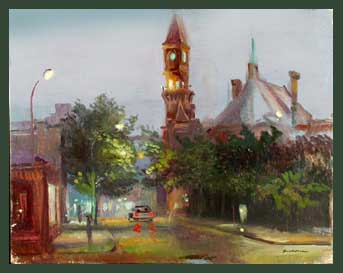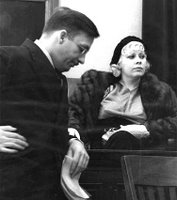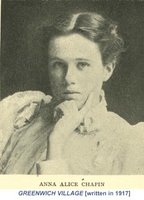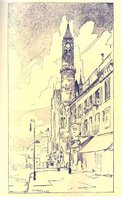Poor women in Jefferson Market's Night Court were treated shamefully. During the early 1900s, several journalists, reformers, and authors tried to bring this unjust situation to the public's attention. "
Prodigal daughters!" wrote Rheta Childe Dorr. "
Between December, 1908, and December, 1909, no less than 5,000 of them passed through the guarded door, under the blaze of the electric lights. There is never an hour, from nine at night until three in the morning, when the prisoners’ bench in Jefferson Market Court is without its full quota of women. Old — prematurely old, and young — pitifully young; white and brown; fair and faded; sad and cynical; starved and prosperous; rag-draped and satin-bedecked; together they wait their turn at judgment. ..."
• • Jefferson Market justice was at the center of this novel published in 1911:
The Nine-Tenths by James Oppenheim. Here's an excerpt:
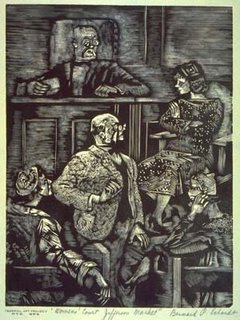
• • "What's your name?"
• • Rhona could not answer for a moment. Then, faintly:
• • "Rhona Hemlitz."
• • "Age?"
• • "Seventeen."
• • "Address?"
• • "---- Hester Street."
• • "Occupation?"
• • "Shirtwaist-maker."
• • "Oh!" he whistled slightly. "Striker?"
• • "Yes."
• • "Picketing?"
• • "Yes."
• • "Held for
Night Court trial. Lock her up, Officer."
• • Blackness closed over the girl's brain. She thought she was going into hysterics. Her one thought was that she must get help, that she must reach some one who knew her. She burst out:
• • "I want to telephone."
• • "To who?"
• • "Mr. Blaine - - Mr. Blaine!"
• • "West Tenth Street feller [i.e., a bail bondsman]?"
• • "Yes."
• • The sergeant winked to the policeman.
• • "Oh, the matron'll see to that! Hey, Officer?"
• • Rhona felt her arm seized, and then had a sense of being dragged, a feeling of cool, fetid air, a flood of darkness, voices, and then she knew no more. The matron who was stripping her and searching her had to get cold water and wash her face....
• • Later Rhona found herself in a narrow cell, sitting in darkness at the edge of a cot. Through the door came a torrent of high-pitched speech.
• • "Yer little tough, reform! reform! What yer mean by such carryings-on? I know yer record. Beware of God, little devil...."
• • On and on it went, and Rhona, dazed, wondered what new terror it foreboded. But then without warning the talk switched.
• • "Yer know who I am?"
• • "Who?" quavered Rhona.
• • "The matron."
• • "Yes?"
• • "I divorced him, I did."
• • "Yes."
• • "My husband, I'm telling yer. Are yer deef?"
• • Suddenly Rhona rose and rushed to the door. "I want to send a message."
• • "By-and-by," said the matron, and her rum-reeking breath came full in the girl's face. The matron was drunk.
• • For an hour she confided to Rhona the history of her married life, and each time that Rhona dared cry, "I want to send a message!" she replied, "By-and-by."
• • But after an hour was ended, she remembered.
• • "Message? Sure! Fifty cents!"
• • Rhona clutched the edge of the door.
• • "Telephone - - I want to telephone!"
• • "Telephone!" shrieked the matron. "Do yer think we keep a telephone for the likes of ye?"
• • "But I haven't fifty cents - - besides, a message doesn't cost fifty cents - - "
• • "Are yer telling
me?" the matron snorted. "Fifty cents! Come now, hurry," she wheedled. "Yer know as yer has it! Oh, it's in good time you come!"
• • Her last words were addressed to some one behind her. The cell door was quickly opened; Rhona's arm was seized by John, the policeman, and without words she was marched to the curb and pushed into the patrol wagon with half a dozen others. The wagon clanged through the cold, dark streets, darting through the icy edge of the wind, and the women huddled together. Rhona never forgot how that miserable wagonful chattered - - that noise of clicking teeth, the pulse of indrawn sighs, and the shivering of arms and chests. Closer and closer they drew, as if using one another as shields against the arctic onslaught, a couple of poor women, and four unsightly prostitutes, the scum of the lower Tenderloin. One woman kept moaning jerkily:
• • "Wisht I was dead -- down in my grave. It's bitter cold -- "
• • The horses struck sparks against the pave, the wheels grided, and the wagon-load went west, up the shadowy depths of Sixth Avenue, under the elevated structure, and stopped before
Jefferson Market Court. The women were hustled out and went shuddering through long corridors, until at last they were shoved into a large cell.
* * * * *
• • At about the same moment, Myra and Joe emerged from the West Tenth Street house and started for the court-house. They started, bowing their heads in the wind, holding on to their hats.
• • "Whew!" muttered Joe. "This is a night!"
• • Myra did not dare take his arm, and he spoke a little gruffly.
• • "Better hang on to me."
• • She slipped her arm through his then, gratefully, and tried to bravely fight eastward with him.
• • Joe was silent. He walked with difficulty. Myra almost felt as if she were leading him. If she only could have sent him home, nursed him and comforted him! He was so weary that she felt more like sending him to bed than dragging him out in this bitter weather.
• • More and more painfully he shuffled, and Myra brooded over him as if he were hers, and there was a sad joy in doing this, a sad glory in leading him and sharing the cruel night with him.
• • In this way they gained the corner of Sixth Avenue. Across the way loomed the illuminated tower-topped brick court-house.
• • "Here it is," said Joe.
• • Myra led him over, up the steps, and through the dingy entrance. Then they stepped into the court-room and sat down on one of the benches, which were set out as in a school-room.
• • The place was large and blue, and dimly lighted. The judge's end of it was screened off by wire netting. Up on a raised platform sat the magistrate at his desk, his eyes hidden by a green shade, his bald head radiant with the electric light above him. Clerks hovered about him, and an anaemic indoor policeman, standing before him, grasped with one hand a brass rail and with the other was continually handing up prisoners to be judged. All in the inclosed space stood and moved a mass of careless men, the lawyers, hangers-on, and all who fatten upon crime - - careless, laughing, nudging, talking openly to the women of the street. A crass scene, a scene of bitter cynicism, of flashy froth, degrading and cheap. Not here to-night the majesty of the law; here only a well-oiled machine grinding out injustice.
• • Joe and Myra were seated among a crowd of witnesses and tired lawyers. The law's delay seemed to steep the big room with drowsiness; the air was warm and breathed in and out a thousand times by a hundred lungs. Myra looked about her at the weary, listless audience. Then she looked . . .
__ ___
Source:http://jeffersonmarketcourthouseny.blogspot.com/atom.xml
 Jefferson Market
Jefferson Market• • Woodcut of Jefferson Market's infamous Women's Court • Bernard P. Schardt • •
NYCNew York Public LibraryJefferson Market.

